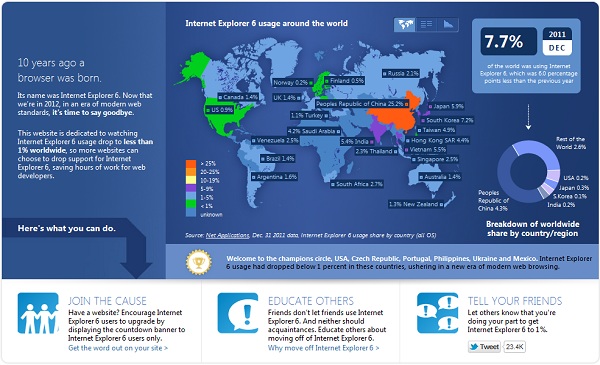Brought into the world in 2001 and at the time a seemingly great innovation, Microsoft's Internet Explorer 6 web-browser soon became a thorn in the backside of web-developers across the world. For the end-user, the browser was riddled with security flaws and lacking next-gen features such as tabs and full HTML5 support; for the web-developer, the browser lacked standards compliant support for CSS version two, the styling script used to layout a page, resulting in developers having to write special workarounds and spend significant extra time on making their sites IE 6 friendly.
Due to some incredible oddity, or perhaps, that end-users and businesses alike weren't too keen on upgrading, Internet Explorer 6 has remained a prevalent browser in the market for over 10 years, forcing web developers to continue to dedicate time and resources to the browser and exposing end-users to security risks and increasing levels of webpage incompatibility.
Fairly recently popular sites, such as Google and Facebook, dropped support for the old browser, both to make the life of their developers easier and to move users away from IE 6, joining the fight to see the browser go was Microsoft itself, who began a webpage, www.ie6countdown.com, breaking-down the remaining percentage of IE 6 users across each territory, with the aim of reducing IE 6 usage to below one per cent across the world.

Last month, the US finally joined the likes of Austria, Norway and Finland in reducing its user base to below the one per cent line. Many countries are now not far behind, with most, like the UK, lagging as businesses and governments consider moving browsers a considerable costing exercise, as security risks would need re-evaluating, despite IE 6 coming from a generation of browsers not focused on security and reports of many outstanding security holes.
For less obvious reasons, usage of IE 6 in the Far East remains relatively high, with countries such as India and Japan still reporting over a five per cent user base, with China well above the trend of the rest of the world with over one in four still using the antiquated browser, however the US was a large market, and with the rest of the world, bar China, likely to follow trend in 2012, it truly appears as though IE 6 will be removed from mainstream web development sometime this year, which will likely prove the year in which the browser is officially pronounced as, dead.
Web-developers rejoice.













